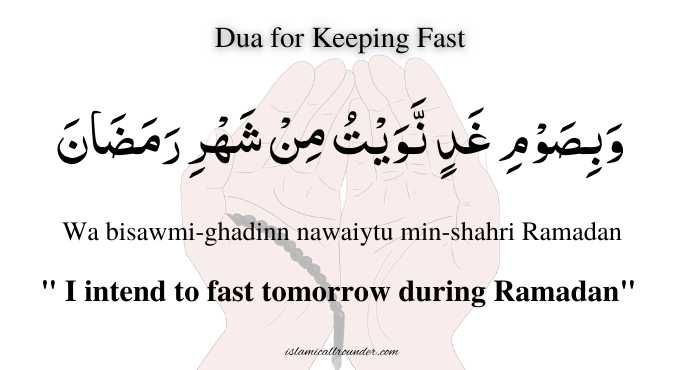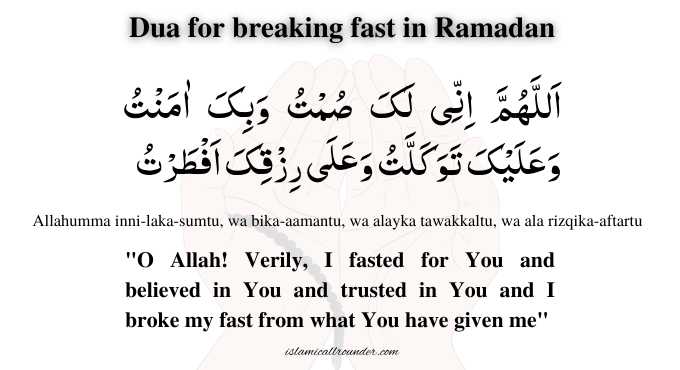Fasting during Ramadan is one of the Five Pillars of Islam, serving as a time for spiritual reflection, self-discipline, and devotion to Allah. Muslims worldwide observe fasting from dawn to sunset, refraining from eating, drinking, and sinful behavior. The Dua for fasting in Ramadan holds excellent significance, as it helps Muslims renew their intentions and seek Allah’s guidance throughout this holy month. By understanding the importance of these prayers, Muslims can enhance their spiritual experience and strengthen their relationship with Allah.
Fasting during the month of Ramadan is obligatory for Muslims. The main purpose of this is to prevent them from doing evil and to make them habitual of doing well. The fasting period begins with Sehri and ends with Iftar. Muslims also recite certain prayers while fasting and breaking their fast; let us teach you those Duas for fasting in Ramadan.
The Significance of Dua in Islam
What is Dua?
Dua is a supplication or prayer Muslims make to Allah, seeking His help, guidance, and forgiveness. It is an act of worship demonstrating a believer’s dependence on Allah and trust in His wisdom and mercy. Duas can be made at any time, but certain times are considered more favorable, such as during Ramadan, the last third of the night, and while fasting.
The Role of Dua During Ramadan
Ramadan is a time when Muslims are encouraged to increase their acts of worship, including making duas. The Prophet Muhammad (PBUH) emphasized the importance of making duas during this sacred month, particularly when breaking the fast. The dua for fasting in Ramadan is not just a ritual but a profound expression of faith and submission to Allah’s will.
Dua For Fasting In Ramadan
” وَبِصَومِ غَدٍ نَّوَيْتُ مِنْ شَهْرِ رَمَضَانَ “

Before beginning the fast at dawn (Suhoor), Muslims recite the following Dua to express their intention:
“Wa bisawmi ghadin nawaytu min shahri Ramadan.”
Translation: “I intend to keep the fast tomorrow in the month of Ramadan.”
This prayer declares one’s commitment to fasting and reminds one of the spiritual journey ahead. It helps set a clear intention, a critical aspect of fasting in Islam.
It is also essential to know that this supplication is not mentioned in the particular hadith. The point is that when you start fasting, you should only make an intention. Intention means having a solid intention to do something.
In the religion of Islam, intention is obligatory only in acts of worship. It is the name of the intention of the heart. It is not necessary to perform the words of the intention with the tongue, but if you do the intention with both the heart and the tongue, it will also be an admirable act.
Dua for breaking fast in Ramadan
Dua for breaking the fast has been described in different ways with similar words in the hadith As Hazrat Mu’adh says, the Holy Prophet has also read these words:
At sunset, when it is time to break the fast (Iftar), Muslims recite this Dua:
“Allahumma inni laka sumtu wa bika aamantu wa ‘alayka tawakkaltu wa ‘ala rizq-ika-aftartu.”
اَللَّهُمَّ لَکَ صُمْتُ وَعَلَی رِزْقِکَ اَفْطَرْتُ
“O Allah! I fasted for you and broke my fast on the sustenance provided by you”
A very well-known dua that Muslims recite while breaking their fast is the following:
” اَللَّهُمَّ اِنِّی لَکَ صُمْتُ وَبِکَ اٰمَنْتُ وَعَلَيْکَ تَوَکَلَّتُ وَعَلَی رِزْقِکَ اَفْطَرْتُ “

Benefits of Reciting Dua During Fasting
Reciting the Dua for fasting in Ramadan provides several spiritual and emotional benefits:
- Strengthens Faith and Taqwa (Piety): Regularly making Dua reminds Muslims of their reliance on Allah, fostering a stronger connection with their Creator.
- Encourages Patience and Gratitude: Fasting is a test of self-control and patience, and Duas helps reinforce these virtues by focusing on Allah’s blessings.
- Promotes Spiritual Growth: Ramadan is a time for spiritual cleansing and growth. Making Dua allows Muslims to seek forgiveness for their sins and ask for guidance in becoming better individuals.
- Enhances Mental Peace: Dua can have a calming effect, providing solace and comfort during the challenging moments of fasting.
How to Make the Most of Your Duas During Ramadan
Best Practices for Making Dua
- Be Sincere and Focused: Make your Dua with a sincere heart, free from distractions, and total concentration on Allah.
- Use Clear and Simple Language: While making Dua, use language that is easy to understand and conveys your needs.
- Start with Praise and Gratitude: Begin your Dua by praising Allah and expressing gratitude for His countless blessings.
- Seek Forgiveness: Ask for forgiveness for past mistakes and sins to cleanse your heart and soul.
- Be Persistent: Keep hope if your Dua is answered. Allah knows what is best for you and when to grant your requests.
Semantically Related Keywords
Related keywords such as:
- Ramadan fasting benefits
- Suhoor and Iftar Duas
- Importance of fasting in Islam
- Ramadan prayer for fasting
- How to make Dua effectively
Frequently Asked Questions (FAQs)
What is the purpose of the Dua for fasting in Ramadan?
The purpose of the Dua for fasting in Ramadan is to express one’s intention to fast and to seek Allah’s help and blessings throughout the fast. It serves as a spiritual reminder of the commitment to fasting and obedience to Allah’s commandments.
When should the Dua for fasting be recited?
The Dua for fasting should be recited twice a day:
- Before beginning the fast (Suhoor), express your intention to fast.
- When breaking the fast (Iftar), thank Allah for His sustenance and strength in completing the fast.
Can Duas be made in any language?
Yes, Duas can be made in any language the believer understands best. The most crucial aspect is sincerity and a heartfelt connection to Allah.
Why is Ramadan a significant time for making Dua?
Ramadan is a month of heightened spirituality, reflection, and worship. It is believed that Duas made during Ramadan, especially while fasting and at the time of breaking the fast, are more likely to be accepted by Allah.
How can one enhance the experience of making Dua during Ramadan?
To enhance the experience of making Dua during Ramadan:
- Choose quiet, serene moments for reflection and prayer.
- Engage in additional acts of worship, like reading the Quran and performing extra prayers.
- Focus on personal growth and spiritual renewal.
Conclusion
The Dua for fasting in Ramadan is a powerful tool for spiritual growth and connection with Allah. By understanding its significance and practicing it sincerely, Muslims can enhance their fasting experience and draw closer to their Creator. Remember to make the most of this holy month by engaging in various acts of worship, making Duas regularly, and striving for personal and spiritual improvement.
We should read the duas when starting and breaking the Ramadan fast, but if a Muslim does not read these Arabic duas and just makes the intention in his heart, there is no problem. Reciting these supplications is a better practice because such supplications are mostly narrated by the Prophet.
See from us more related:
